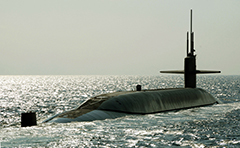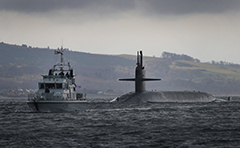The Largest Submarine in The U.S. Navy
The Ohio class is a class of nuclear-powered submarines currently used by the United States Navy. The navy has 18 Ohio-class submarines: 14 ballistic missile submarines (SSBN) and four that were later converted to guided missile submarines (SSGN).
 The Ohio class was named after the lead submarine of this class, USS Ohio. The 14 Trident II SSBNs together carry approximately fifty percent of the total US active inventory of strategic thermonuclear warheads. Although the Trident missiles have no pre-set targets when the submarines go on patrol, the warships are capable of quickly being targeted using secure and constant radio communications links, including very low frequency (VLF) systems. All the Ohio-class submarines, except for USS Henry M. Jackson, are named for U.S. states, which until that point was a tradition reserved for battleships and cruisers.
The Ohio class was named after the lead submarine of this class, USS Ohio. The 14 Trident II SSBNs together carry approximately fifty percent of the total US active inventory of strategic thermonuclear warheads. Although the Trident missiles have no pre-set targets when the submarines go on patrol, the warships are capable of quickly being targeted using secure and constant radio communications links, including very low frequency (VLF) systems. All the Ohio-class submarines, except for USS Henry M. Jackson, are named for U.S. states, which until that point was a tradition reserved for battleships and cruisers.
The Ohio-class submarines are the largest submarines ever built for the U.S. Navy. Two classes of the Russian Navy's submarines have larger total displacements: the Soviet-designed Typhoon-class submarines have more than twice the total displacement, and Russia's Borei-class submarines have roughly 25 percent greater displacement, but the Ohio-class boats carry more missiles than either: 24 Trident missiles per boat, versus 16 missiles for the Borei class (20 for the Borei II) and 20 for the Typhoon class.
 The Ohio-class submarines were designed specifically for extended war-deterrence patrols. Each of these submarines is provided with two complete crews, called the Blue crew and the Gold crew, with each crew serving typically on 70- to 90-day deterrent patrols. To decrease the time in port for crew turnover and replenishment, three large logistics hatches have been installed to provide large-diameter resupply and repair access. These hatches allow rapid transfer of supply pallets, equipment replacement modules, and machinery components, significantly reducing the time required for replenishment and maintenance of the submarines.
The Ohio-class submarines were designed specifically for extended war-deterrence patrols. Each of these submarines is provided with two complete crews, called the Blue crew and the Gold crew, with each crew serving typically on 70- to 90-day deterrent patrols. To decrease the time in port for crew turnover and replenishment, three large logistics hatches have been installed to provide large-diameter resupply and repair access. These hatches allow rapid transfer of supply pallets, equipment replacement modules, and machinery components, significantly reducing the time required for replenishment and maintenance of the submarines.
The Ohio-class submarines were constructed from sections of hull, with each four-deck section being 42 ft (13 m) in diameter. The sections were produced at the General Dynamics Electric Boat facility, Quonset Point, Rhode Island, and then assembled at its shipyard at Groton, Connecticut. More details
 The Ohio class was named after the lead submarine of this class, USS Ohio. The 14 Trident II SSBNs together carry approximately fifty percent of the total US active inventory of strategic thermonuclear warheads. Although the Trident missiles have no pre-set targets when the submarines go on patrol, the warships are capable of quickly being targeted using secure and constant radio communications links, including very low frequency (VLF) systems. All the Ohio-class submarines, except for USS Henry M. Jackson, are named for U.S. states, which until that point was a tradition reserved for battleships and cruisers.
The Ohio class was named after the lead submarine of this class, USS Ohio. The 14 Trident II SSBNs together carry approximately fifty percent of the total US active inventory of strategic thermonuclear warheads. Although the Trident missiles have no pre-set targets when the submarines go on patrol, the warships are capable of quickly being targeted using secure and constant radio communications links, including very low frequency (VLF) systems. All the Ohio-class submarines, except for USS Henry M. Jackson, are named for U.S. states, which until that point was a tradition reserved for battleships and cruisers.The Ohio-class submarines are the largest submarines ever built for the U.S. Navy. Two classes of the Russian Navy's submarines have larger total displacements: the Soviet-designed Typhoon-class submarines have more than twice the total displacement, and Russia's Borei-class submarines have roughly 25 percent greater displacement, but the Ohio-class boats carry more missiles than either: 24 Trident missiles per boat, versus 16 missiles for the Borei class (20 for the Borei II) and 20 for the Typhoon class.
 The Ohio-class submarines were designed specifically for extended war-deterrence patrols. Each of these submarines is provided with two complete crews, called the Blue crew and the Gold crew, with each crew serving typically on 70- to 90-day deterrent patrols. To decrease the time in port for crew turnover and replenishment, three large logistics hatches have been installed to provide large-diameter resupply and repair access. These hatches allow rapid transfer of supply pallets, equipment replacement modules, and machinery components, significantly reducing the time required for replenishment and maintenance of the submarines.
The Ohio-class submarines were designed specifically for extended war-deterrence patrols. Each of these submarines is provided with two complete crews, called the Blue crew and the Gold crew, with each crew serving typically on 70- to 90-day deterrent patrols. To decrease the time in port for crew turnover and replenishment, three large logistics hatches have been installed to provide large-diameter resupply and repair access. These hatches allow rapid transfer of supply pallets, equipment replacement modules, and machinery components, significantly reducing the time required for replenishment and maintenance of the submarines.The Ohio-class submarines were constructed from sections of hull, with each four-deck section being 42 ft (13 m) in diameter. The sections were produced at the General Dynamics Electric Boat facility, Quonset Point, Rhode Island, and then assembled at its shipyard at Groton, Connecticut. More details
